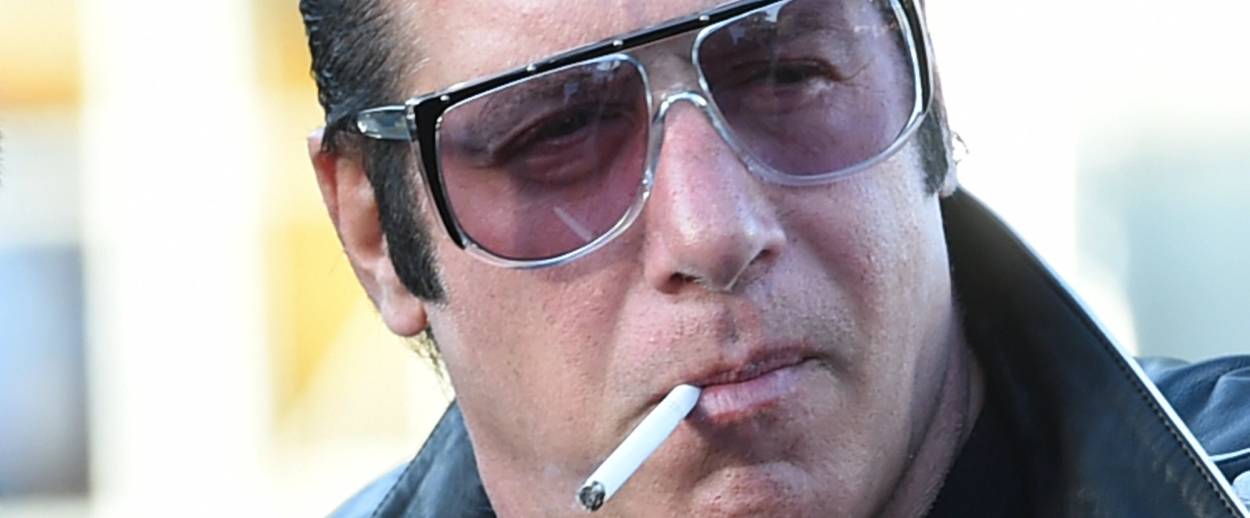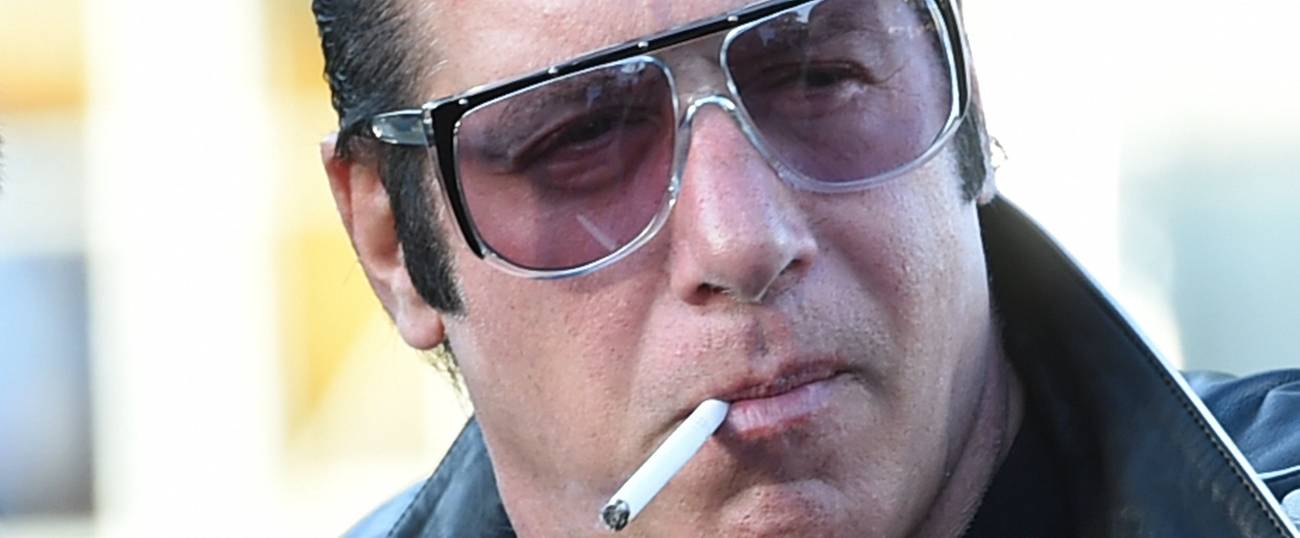Andrew Dice Clay’s Horrible Magnetism Is Back
Showtime’s new comedy ‘Dice’ stars the vulgar, Brooklyn-born comedian whose career could seemingly only reemerge now, during an American cultural nadir brought to you by Donald Trump




Why does the Showtime series Dice, which premiers this coming Sunday at 9:30, even exist?
What horrifying aspects of America, the world, or the contemporary human condition are illuminated through the fact of Andrew Dice Clay becoming a plausible frontman for a prestige sitcom in this, the year 2016 of the Common Era? This is not The Diceman’s time, this epoch of fanatical tone-policing, resurgent political correctness, and energetic identity politics. And yet, it is very much The Diceman’s time, this epoch of testosterone-fueled grievance and Trumpian vulgarity. Clay, a Jew from Sheepshead Bay who became the first comic to sell out Madison Square Garden on consecutive nights in 1990, was born Andrew Clay Silverstein. His act embodies everything that America’s shifting cultural standards had supposedly flushed out, and one of about a zillions reminders that certain things just can’t stay flushed out for long.
Indeed, there may be some primal (and perhaps specifically male) human urge laugh at lines like, “Little Miss Muppet sat on her tuffett/ Eating her curds and whey/ Along came a spider and sat down beside her/ Said hey, what’s in the bowl, bitch?” regardless of what year it is, and regardless of whether advances in American cultural sensitivity (and, for that matter, American comedy), have condemned The Diceman to obscurity. So it is both incomprehensible and yet readily comprehensible that Clay, who released a memoir in 2014 called (naturally) The Filthy Truth, is continuing to forge a comeback nearly a quarter-century after his misogynistic and racially insensitive Brooklyn tough-guy routine briefly turned him into the most successful act in comedy.
And luckily for hyper-repellent figures like Clay, the dissonance of balancing a sense of humor—really, an avatar for one’s deepest and truest being—against social standards and human decency isn’t going away anytime soon. The topic has already made for fertile artistic ground: It’s been fuel for a classic episode of the British version of The Office, and the focus of the entire latest season of South Park.
Thanks to Clay’s involvement, Showtime’s Dice is uniquely qualified to contribute to this vital social, political, and metaphysical discussion about humor, social standards, and personal disgust. And besides, the timing for a show starring Andrew Dice Clay—an icon of tastelessness, a totem of unselfconscious machismo—couldn’t be better, what with the very real possibility that the magnetically odious Donald Trump will be a major party presidential candidate. One could even argue that Trump is just speaking to the wrong crowd. If given a comedic pulpit, his act might be pretty Diceman-like—just as Clay’s was eerily Trump-like, back during the comic’s heyday.

In a 1990 article for the Village Voice, Ivan Solotaroff noted that Clay “had the demagogue’s genius for the lowest common denominator,” and likened a sold-out Meadowlands arena show in front of 21,000 mostly-white and working-class fans to “land[ing] in the middle of some Erskine Caldwell story about a leisurely Saturday afternoon lynching.” Clay’s gifts for maximal transgression, and, Solataroff suggests, for stimulating the darker regions of the white male id, could hypnotize arena-sized crowds: “Dice shows are an event, a spectacle, kind of a religion,” one young fan explains to him. Donald Trump’s presidential campaign illustrates the dangers of these Clay-like qualities when they’re weaponized for serious national political messaging. Could Andrew Dice Clay be the one to rescue extreme provocation from Trump’s nasty clutches, to remind us that letting go and just sort of letting ourselves be appalled is a healthy and even necessary antidote to cognitive dissonances that can’t be resolved any other way?
The series premiere of Dice suggests, maybe not! (But judge for yourself, the whole thing’s on Showtime’s website for free.) “I was doing 80,000 seats a week,” Clay says in the series’ opening line, forcing his audience to reflect on this unpleasant and frankly embarrassing fact—although the follow-up line, that he “moved to Vegas to make life a little easier,” is a genuinely funny and subtle reflection on the insanity of early’90s peak-Dice.
The plot of Dice is pretty standard fare. Dice and his live-in girlfriend—played by Natasha Leggaro, and a character whose only mode or personality trait appears to be permanent exhaustion with The Diceman—must attend the same-sex wedding of the girlfriend’s brother. And guess what, it’s at a casino! Opportunities for boorishness and troublemaking abound. How could Dice not nearly come to blows with an Elvis impersonator, or hoodwink multiple casino floor bosses, or give a scatological and unsolicited yet oddly heartfelt wedding speech that everyone seems to appreciate for some unexplained and dramatically incoherent reason? As he reminds us at every possible opportunity, “I’m Dice.”
Or is he? There are the moments of winking self-awareness, which have the double purpose of allowing Clay to acknowledge his awfulness without exactly atoning for it: “There’s a big difference between Andrew the guy who’s in front of you right now and the guy onstage when I’m performing,” Clay assures his wife’s incredulous future brother-in-law, with self-consciously dubious credibility.
There are moments in which Dice’s comedic talents shine, including an extended rant against casino ATM fees that exhibits the bludgeoning witticism that helped make him so famous in the first place. There are times where Dice flirts with delivering on the promise of bridging our era’s cognitive gulfs without plummeting to Trump or even Diceman-like depths: “It’s not gay marriage, it’s just marriage,” Clay whispers, intoning a poignant lesson in coexistence at almost the exact moment a Liza Minelli impersonator declares the newlyweds husband and husband. (In what must be a naked appeal to Tablet readers, there’s even a “mazel tov” thrown in.)
Clay still has surprising onscreen magnetism. There’s something exuberant and even joyful about his terribleness, a welcome reprieve from the sad-sack male archetype that seems to dominate so much TV comedy. The show isn’t exactly bad. The pilot almost justifies itself, but any larger sense of exactly what we’re doing back in Diceland after 25 years is an urgent matter for future episodes to resolve.
For now, get your fill with Donald Trump, who’s also on TV.
Armin Rosen is a staff writer for Tablet Magazine.